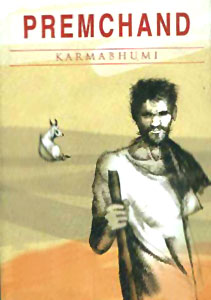Karmabhumi deals with the human condition, their existence, ecstasy and agony in the society. The interrelationship between individuals, love and faith happens to be the principal theme of the novel, "Karmabhumi". Set on the background of Uttar Pradesh in the 20th century, Karmabhumi delineates the peaceful existence and the sudden outburst of the Islams and the Hindus owing to the initiation of education. The commencement of the education is a direct attack to the social barriers between the Hindus and the Muslims. On an apparent level though "Karmabhumi" is a picture of society, human life is portrayed as a field of action in the novel by which the character and destinies of individuals are formed and revealed through their actions.
Author: - Munshi Premchand, whose original name was Dhanpat Rai Srivastava was born on 31st July 1880 in Varanasi. A true child of Renaissance, Munshi Premchand was concerned about the social problems and the human life inextricably associated with the society. Society and the human beings as a part of the society being the principal theme, his novels always had an aura of realism. Shifted from the archaic language of the Hindi Literature, Munshi Premchand depicted the social problems in the dialectics of the common people. The socio-religious problem in the contemporary ethos is the principal subject Munshi Premchand deals with.
 Synopsis: - Ingrained in the socio-political tribulations dominated by the religious discrimination, Premchand`s Karmabhumi is a psychological probing delineating the human relationships. Through his protagonists and their yearnings, love, laughter, tears, trials and tribulations, the author subtly brings alive the India of the early decades of the twentieth century, at the same time delivering a powerful social and political message. "Karmabhumi" deals with some inconsistent personalities, who are more human and spontaneous. Hindu Muslim unity, shared objective of the welfare of these two communities; and the non-violent struggle of the untouchables, peasants, and the city`s poor for their rights are adroitly interwoven in the novel "Karmabhumi". Karmabhumi deals with the topical issues, which are very much of its time and with the passage of time has become an international issue. Karmabhumi, completely detached from the urban life, depicts the authentic picture of rural India. However the novel ends with an appealing innocent idealism, though it seems quite anachronistic today.
Synopsis: - Ingrained in the socio-political tribulations dominated by the religious discrimination, Premchand`s Karmabhumi is a psychological probing delineating the human relationships. Through his protagonists and their yearnings, love, laughter, tears, trials and tribulations, the author subtly brings alive the India of the early decades of the twentieth century, at the same time delivering a powerful social and political message. "Karmabhumi" deals with some inconsistent personalities, who are more human and spontaneous. Hindu Muslim unity, shared objective of the welfare of these two communities; and the non-violent struggle of the untouchables, peasants, and the city`s poor for their rights are adroitly interwoven in the novel "Karmabhumi". Karmabhumi deals with the topical issues, which are very much of its time and with the passage of time has become an international issue. Karmabhumi, completely detached from the urban life, depicts the authentic picture of rural India. However the novel ends with an appealing innocent idealism, though it seems quite anachronistic today.
Karmabhumi is not the narrative depicting the story of a single individual rather it is the story of the entire human condition in the contemporary society. The title signifies the entire society, where the human behavior and reactions defines their interrelationship. The title "Karmabhumi" is symbolically poignant enough defining the society as the "Bhumi" and the human behavior as the "Karma" collectively called Karmabhumi.



















